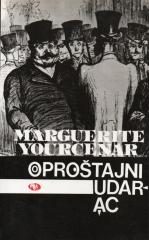Marguerite Yourcenar
French writer (Brussels, June 8, 1903 – Mount Desert Island, Maine, USA, December 17, 1987). She was educated privately and acquired a broad humanistic education. From an early age, financially secured by an inheritance, she decided to dedicate herself to literature; She published her first work, the poem The Garden of Chimeras, in 1921. She lived in the USA from 1940; for some time she taught literature at Sarah Lawrence College in New York. Year In 1980, she was the first woman elected to the French Academy. The most significant in her literary work are the novels: epistolary Alexis or discussion of a futile struggle, set in Austria before the First World War, written in the spirit of A. Gide's poetics, Coin of a dream, about Rome in the Mussolini era, Deadly blow, in which the theme of unrequited love on the background of the evocation of the wars in the Baltic countries in 1919–21, and, as the central and most psychologically subtle, Hadrian's Memoirs and The Black Shift. The first of those two, written in the form of imaginary memories of the Roman emperor Hadrian through his letter to Marcus Aurelius, as a long elaborate inner monologue, established an influential model of the historical novel, i.e. the novelistic reconstruction of the past, and at the same time is the ultimate expression of melancholy towards the ancient world from the period before that he was gripped by a comprehensive crisis. The second is a biography of the fictional character of the alchemist and scholar Zeno, conceived as a "universal man" (a sort of combination of Leonardo da Vinci, Paracelsus, N. Copernicus and G. Bruno), set in the European XVI century. Both novels base their evocation of the past on careful, but also creative reading of historiographical sources, thoughtful, almost mystical immersion in the hero and transition into meditations on human destiny, morality and power, and especially on art with an implicit interpretation of the world as an artistic act with which ruling or alchemy is identified. She also wrote poetic prose, novellas, which she collected in the collections Death Drives a Cart, Oriental Tales, Like Flowing Water, plays and memoir prose. In her erudite conception of literature, Yourcenar mostly followed the classicist tradition stylistically, connecting the elegance of expression with a rich vocabulary, an elaborate meditative tone and occasional baroque descriptions. She also wrote essays on K. Kavafis, S. Lagerlöf, T. Mann, Mishima Yuki, whom she also translated, as well as H. James, V. Woolf, J. Baldwin, African-American spiritual poems and ancient Greek lyrics.
Titles in our offer
Oproštajni udarac
The great writer's short novel The Parting Shot is one of those great works in which the conciseness of the statement and the brevity of the form emanate the fullness of the text and the passion of its meanings.
